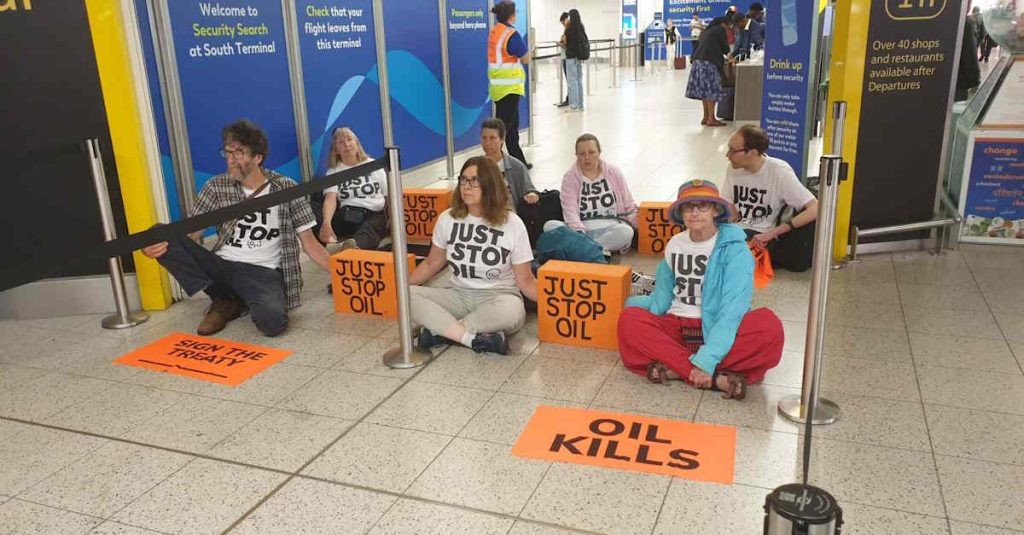A protest by Just Stop Oil at Gatwick’s South Terminal led to arrests yet left airport operations unaffected.
The demonstrators sought to disrupt by blocking gates, but the attempt was efficiently managed without impacting flights.
Protest Overview
In an incident early Monday morning, a group of seven activists from Just Stop Oil executed a protest at the Gatwick Airport South Terminal. Their method involved using suitcases with lock-on devices to effectively block access to departure gates, aiming to disrupt airport operations as a statement against ongoing fossil fuel reliance. Despite their actions, airport operations remained uninterrupted, and the participants were swiftly arrested and removed from the premises. This intervention forms part of a broader strategy to apply pressure on political leaders globally.
Impact on Operations
According to a spokesperson for Gatwick Airport, the protest did not impact airport operations. Flights continued to operate as scheduled, with no delays or cancellations reported. The swift action of authorities ensured that the airport maintained its regular functioning, mitigating any potential disruptions to passengers.
While the protest aimed to draw attention to climate issues, the immediate response by authorities highlights the robustness of Gatwick’s operational protocols. The airport’s preparedness and efficient crisis management were evident as they managed to avoid chaos within the terminal.
Activists’ Intentions
Just Stop Oil has been vocal about its goals to challenge the existing political landscape regarding climate change. In a statement released by the group, they expressed a firm stance on taking ‘proportionate action’ until substantial steps are taken by leaders to address climate change. Their activities are part of a larger campaign to declare areas significant to the fossil fuel industry as ‘sites of civil resistance.’
The group’s action at Gatwick is a reflection of their ongoing mission to instigate change. By targeting high-profile locations, the protesters aim to spark conversation and increase awareness about the climate crisis, urging the community and leaders to reconsider their environmental policies.
In their statement, Just Stop Oil emphasised the need for ‘swift and decisive action’ to combat climate breakdown, reflecting a sense of urgency and commitment to their cause.
Broader Context
This Gatwick incident is one of many demonstrations held worldwide, signalling increasing frustration among activists over perceived inaction on climate issues. As environmental concerns escalate, actions such as these highlight the ongoing tension between activist groups and authorities.
The climate crisis is a pressing issue that continues to provoke global debate. It raises questions about the effectiveness of current environmental policies and the measures needed to enforce sustainable practices. The repeated protests by environmental groups underscore the demand for change at both local and international levels.
The focus on key economic areas is a deliberate tactic by activists. By disrupting sites integral to the fossil fuel economy, groups like Just Stop Oil hope to force the hand of political and business leaders, pushing them towards greener solutions.
Public and Political Reaction
Although the protest did not disrupt airport operations, it sparked discussions among travellers and the general public online. Many expressed their support for environmental advocacy, while others criticised the methods used by the activists.
Politically, these protests add to the growing pressure on leaders to address climate change more aggressively. The government’s response to such movements will be pivotal in shaping public policy and the nation’s environmental strategy.
Lawmaker’s responses varied, with some acknowledging the protesters’ concerns yet criticising the approach taken. This reflects a broader political divide on how best to address climate goals without hindering economic stability.
Social Media and Public Discourse
On platforms like Twitter, the protest garnered significant attention, with hashtags related to climate change trending as users shared their opinions. Some tweets highlighted the importance of bold actions in driving climate policy, while others questioned the legality and ethics of such demonstrations.
The online conversation revealed a polarised public opinion, with debates extending into the necessity and impact of civil disobedience in the fight against climate change.
Furthermore, the digital discourse mirrors the ongoing societal debate about priorities – balancing economic growth with environmental sustainability remains a contentious topic.
Arrests and Legal Consequences
The swift arrest of the activists underscores the legal implications of such protests. Authorities acted promptly to detain the individuals, signalling a no-tolerance approach towards disruptions in critical infrastructure.
The Gatwick protest reflects growing climate activism tension, balancing legal and operational frameworks.
It underscores the complex dialogue between environmental urgency and societal infrastructure, prompting ongoing debate.

